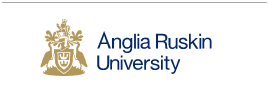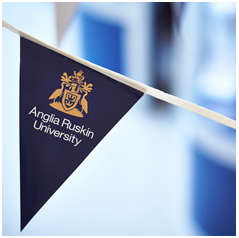ANGLIA RUSKIN UNIVERSITY

Our History

Anglia Ruskin’s story starts in 1858, when the art critic, patron and philanthropist John Ruskin opened Cambridge School of Art. The art school grew to become Anglia Ruskin University, and it’s still at the heart of our modern-day campus in Cambridge.
Over the years, a number of colleges and institutes have become part of Anglia Ruskin. They include the Cambridgeshire College of Arts and Technology (CCAT) and the Essex Institute of Higher Education (formerly the Chelmer Institute – itself formed from the Mid-Essex Technical College and the Brentwood College of Education). At first, these colleges combined to become Anglia Polytechnic, and then Anglia Polytechnic University in 1992. We’ve been known as Anglia Ruskin University since 2005.
We’re proud to count graduates of all these institutions among our alumni.
Four main campuses
As well as Cambridge, we have campuses in Chelmsford, London and Peterborough. Our Chelmsford campus was originally in the city centre but moved to a new, purpose-built site in 1992. Today, you’ll find our striking, modern buildings nestled by the river in the city’s University and Innovation Quarter. Meanwhile, our campus at Guild House, Peterborough opened in 2011. It’s a dedicated healthcare site where we train many of our region’s nurses and healthcare professionals.
In 2015 we were pleased to introduce a new campus in the heart of London, where students study subjects including business, law and finance at undergraduate and postgraduate level.
We’ve invested £122 million in our campuses in recent years. Cambridge benefitted from a major redevelopment in 2011, and in 2014 we completed work on our dedicated healthcare site on Young Street. It houses state-of-the-art clinical skills labs including mock hospital wards. Young Street is also home to our specialist Music Therapy Centre.
Meanwhile, in Chelmsford we’ve embarked upon an ambitious programme of development. In 1995, Her Majesty The Queen opened the fittingly named Queen’s building, which is home to the University Library. Sawyer's Building then opened, which now houses our brand new Super Lab, followed by our eye-catching Lord Ashcroft International Business School, which opened in 2003. It’s since been joined by (among others) the Tindal building in 2005, where our Students’ Union is based; the Postgraduate Medical Institute in 2011, with its cutting-edge simulation suites; and most recently The MedBIC in 2014, which offers labs, workshops and office space to small businesses in the medical and advanced engineering sectors.
A national and international presence
As well as our four main campuses, we have a number of partner institutions in the UK and overseas, giving you the chance to study for an Anglia Ruskin qualification near to home. The first partnerships were formed in the early 1990s. Our International Office, set up in 1992, fosters further links, and makes sure that our international students receive the support and information they need.
Developing our courses and research expertise
Courses
Our early expertise in the arts and education has broadened, and today we offer courses in computing and technology, engineering, law, business, economics, life sciences and more.
We’ve been a leader in the field of health and social care since 1992, when nursing training was transferred from local health authorities to Anglia Ruskin. As well as our three highly regarded nursing courses, we train midwives, operating department practitioners and social workers.
Of course, the arts and education are still important to us. We train teachers and early years professionals on our Chelmsford campus, and at partner colleges in Harlow and Peterborough. Our MA Children’s Book Illustration is a world-renowned course that builds on the long tradition of the Cambridge School of Art. We’ve embraced 21st-century variations on our more traditional arts courses, too – including computer games art and creative music technology.
Research
In the last decade, we’ve forged ahead with our research work. We have research-active staff across the university, and a growing reputation in this area.
You’ll now find six high-profile research institutes here. The first of these was our Postgraduate Medical Institute, set up in 2008, which carries out ground-breaking medical research and trains healthcare professionals in a range of sophisticated techniques. The Institute for International Management Practice followed in 2009; it’s dedicated to researching in the fields of enterprise, innovation and internationalisation.
In 2010, we established the Cultures of the Digital Economy (CoDE) Research Institute to explore the effects of the digital economy on art, culture and society. Next came the Global Sustainability Institute in 2011. It focuses on issues surrounding climate change and sustainability and has quickly gained a reputation for its topical, high-impact research and reports.
Finally, our two newest institutes were set up in 2014. The Veterans and Families Institute is carrying out valuable research into the impact of military experience on veterans and their loved ones; and the Anglia Ruskin IT Research Institute works to enhance IT systems through intelligent modelling and visualisation.
Alongside these six institutes is a range of research units, dedicated to subjects as diverse as music therapy, eye diseases, children’s book studies, and political history.
In 2014, 12 of our research areas were ranked as ‘world-leading’ in the Government’s Research Excellence Framework (REF).
Anglia Ruskin today
We’ve seen lots of changes in the last 157 years, but one thing has remained the same. We’re still passionate about the advancement of knowledge and the education of students.
Today, we’re one of the largest universities in the East of England, with 35,000 students from 177 countries. We’re well regarded for the quality of our teaching and support – with industry-recognised courses, inspiring tutors and an award-winning Student Services Team.
We’re also known for being welcoming and inclusive. We feel strongly that people from all walks of life should be able to study at university and gain the skills to go into whatever career they choose. And so we’ve invested more than £8 million supporting students who may not otherwise have been able to afford to go to university, or who wouldn’t have considered it as an option. It’s one of the biggest investments by any English university.
We’re proud to display the ‘two ticks’ symbol, and to be a Stonewall Diversity Champion and a Mindful Employer.
Our students’ happiness and wellbeing is really important to us. As well as our Student Services Team, we have a thriving and active Students’ Union which oversees 140 clubs and societies, and a student volunteering programme. We also launched our Sport and Active Anglia programme in 2011, to give all of us – students and staff – lots of opportunities to keep fit and healthy.
Anglia Ruskin in the future
We’ve invested over £122 million in our campuses in the last five years. We’ll be adding a further £98 million to keep pace with innovation.
Future developments include a brand new Science Centre in Cambridge with a ‘super laboratory’ that will serve students of computing and technology, psychology, life sciences, and biomedical and forensic science.
We want our concern for the environment to inform every aspect of what we do. We’re committed to making sustainability a part of every student’s experience by reducing waste, encouraging biodiversity, travelling green, supporting Fairtrade, saving water and more. We also strive to exceed national and sector benchmarks for the sustainability of our buildings and processes.
Our Mission and Values
Our Mission
We are exceptional and imaginative in the advancement of knowledge and education of students. We are passionate about collaboration, innovation and transformation to enhance social, cultural and economic well-being.
Our Values
• A sense of belonging. We are proud to be part of Anglia Ruskin University. We know that lifelong relationships are formed here.
• Academic ambition. We want our teaching and research to be excellent. We are determined that our students and staff will realise their full potential.
• Innovation. We are purposeful, challenging and curious about our world. We are prepared to do things differently. We are creative, entrepreneurial and bring enthusiasm to everything we do.
• Supporting each other. We are friendly and inclusive, and celebrate individuality and diversity. We support and encourage everyone, and strive hard to anticipate and meet needs and aspirations.
• Honesty and openness. We operate with integrity, trust and respect for each other and we deliver on our promises. We share ideas, information and challenges and we seek out views and opinions.
• Concern for the environment. We want our concern for a sustainable environment to inform every aspect of what we do.

